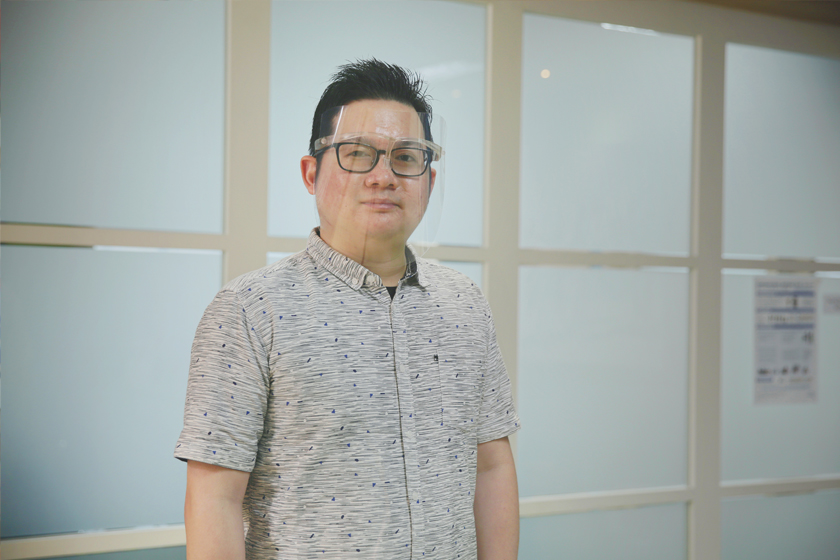Winner of the 2020 Innovation and Entrepreneurship Award
Artificial intelligence is gaining massive popularity for enhancing technology, allowing for automation that can simplify the lives of millions of people.
Dr Irvan Bastian Arief, winner of the 2020 Australian Alumni Award for the Innovation and Entrepreneurship category, has proven that it can also save money and the environment at the same time.
In 2012, Melbourne’s RMIT University launched its Sustainable Urban Precincts Program (SUPP), a $A128 million plan to reduce energy and water use on campus, and significantly lower greenhouse gas emissions.
Lighting alone accounted for the second largest use of electricity on campus. One of the problems the team needed to solve was light automation, as people often forget to turn them off.
To equip thousands of rooms with motion sensors would have been too costly.
Dr Irvan had the brilliant idea of using existing carbon dioxide data to create four new machine learning algorithms that could accurately calculate the occupancy of a room.
Utilising these algorithms together with smart building technology, any building will be able to automate the lights to turn off whenever a room was empty.
“We considered other available data points such as humidity and temperature, but ultimately, carbon dioxide proved to be the most accurate in determining room occupancy,” said Dr Irvan, who obtained his PhD in Computer Science from RMIT University in 2018.
Each of the four machine learning algorithms takes into account variables in carbon dioxide output due to age, exercise, and other factors. “We collaborated with teams in Denmark and Germany to establish a baseline control data,” Dr Irvan elaborated.
The SUPP, run in partnership with tech firms Siemens and Honeywell, is projected to reduce grid electricity use over eight years by an estimated 263 million kilowatt-hours, leading to a 30,000-tonne reduction in greenhouse gas emissions each year—around a 40% reduction to RMIT’s emissions before the project. Water use will be reduced by around 53 million litres per year.
Two of Dr Irvan’s algorithms have been published in the prestigious Q1 scientific journals ACM Transactions on Sensor Networks (TOSN) and Pervasive and Mobile Computing. In 2017, he was invited to the Netherlands to present his work at the 4th ACM International Conference on Systems for Energy-Efficient Built Environments in front of the greater research and scientific community.
One of Dr Irvan’s sterling achievements is using a transfer learning technique for artificial intelligence-based building occupancy prediction model in which limited historical occupancy data is not problematic. This model has been tested in multiple different countries across two different continents and gives accuracy result of 10% higher than the current state-of-the-art model at that time.
Dr Irvan’s work was supported by the Australian Government Research Training Program Scholarship and two RMIT University and Siemens SUPP grants: “iCo2mmunity: Personal and Community Monitoring for University-wide Engagement towards Greener, Healthier, and more Productive Living” and “The Greener Office and Classroom”.
Upon completing his studies in 2018, Dr Irvan brought his passion for the fields of data science and artificial intelligence back to Indonesia.
“I believe that artificial intelligence is the future. To become the leading country in the field, we need to become the innovator,” said Dr Irvan, who also holds a Master’s in Business Information Systems from Monash University (2012).
“Just knowing how to code is not enough. One needs to learn the logic behind the coding to excel in data science and artificial intelligence,” stated Dr Irvan, who previously worked at Indonesia’s e-commerce giant Tokopedia.
“The COVID-19 pandemic has pushed companies and organisations to embrace digitalisation. Some are beginning to realise that digitalisation, data science, and artificial intelligence are not only good to have, but rather, a necessity,” Dr Irvan noted.
In November 2020, Dr Irvan joined travel and entertainment business Tiket.com as Associate Vice President of Data Science.
“To help bring Indonesia’s economy out of the global recession caused by the pandemic, we need to not only focus on industries that are doing well, but also on industries that are struggling,” Dr Irvan stated passionately.
“I want to utilise my expertise to help the travel and live entertainment industry get out of the slump.”
Dr Irvan’s personal goal is to support Indonesia to develop its technology sector, and for artificial intelligence and machine learning to benefit every corner of industry, academia, and government.


 Using Artificial Intelligence to make life smarter, simpler and greener
Using Artificial Intelligence to make life smarter, simpler and greener
